I will show you something that most agencies wouldn’t dare share publicly: a step-by-step SEO for lawyers guide that reveals precisely how to outsmart your competition and dominate Google.
Yes, I’m handing you the exact process we use in our own work—no secrets withheld. I promise this guide will feel like a behind-the-scenes pass to real, results-driven search engine optimization. That alone is enough to get a lot of agencies fired. Why? Because once you see how straightforward (but thorough) the process can be, you’ll recognize the red flags in any lackluster agency’s proposals.

But a word of warning: I’m also going to be brutally honest. Attorney search engine optimization is not a quick fix. It requires consistent effort, an intelligent SEO strategy, and enough patience to let each component take hold. You won’t find it here if you’re looking for a magic bullet or some “hack” that catapults your law firm website to the top overnight. That approach doesn’t exist.
Now, if you’re committed to long-term growth, keep reading. This is the exact formula that’s helped us rank countless law firms across the country. Whether you’re a solo practitioner focused on legal services for personal injury, a full-service practice handling multiple areas, or you’re in a competitive urban market, these principles remain the same.
Let’s start by addressing the elephant in the room: Why does SEO matter so much for law firms in 2025 and beyond?
Why SEO Is Vital for Lawyers (and Why You Should Care)
I can’t stress this enough: search engines have become the go-to resource for people seeking legal help. Most people don’t sift through the Yellow Pages. They type a few words into Google or other search engines, scanning the top results for a firm that seems credible.
But does that mean SEO is your only option? Absolutely not. You can still do billboards, TV ads, or radio spots if you want. The question is, how many prospective clients are you losing by not showing up online at the exact moment they’re ready to hire?
If someone has a legal emergency—maybe they’ve been in a car accident and need a personal injury lawyer—they often search online for help. That’s where you come in. If your firm ranks high, you get the call. They never even know you exist if you’re buried on page three of online search results.
The ROI of Being Found First
When people are in crisis or urgently need counsel, they tend to contact whichever firm they see first in search engine results. That’s why law firm SEO can deliver such a huge return on investment. This is high-intent traffic. They’re actively looking for legal expertise. They’re not aimlessly scrolling social media, hoping to be entertained. They have a problem, and they want help now.
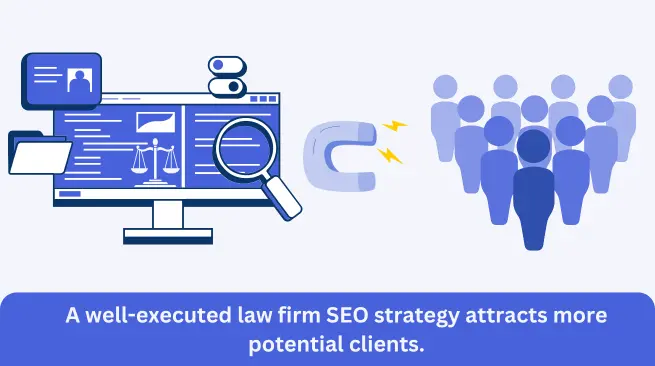
I’m telling you, if you catch them at the precise moment they decide to hire, you’re leagues ahead. That’s why I firmly believe that SEO for lawyers remains the single best method of generating steady, qualified leads—people who already want to work with a lawyer.
But Why Do So Many Law Firms Fail at SEO?
Because they don’t have a roadmap. They either try to do it in-house without the necessary know-how or hire agencies that promise the world but deliver generic strategies. Most law firms end up spending a fortune on questionable “tactics” that produce minimal changes in search engine rankings.
Does that mean SEO is dead? Absolutely not. It just means you need the right SEO plan tailored specifically for law firms, which is one of the most difficult, highly competitive, and lucrative environments in the world of SEO. Trust me on this—consistently executing the correct framework separates the firms that quietly crush it online from those that struggle month after month, wondering why the phone isn’t ringing.
Common Challenges in Law Firm SEO
Let’s talk reality. Why do so many attorneys complain that search engine optimization doesn’t work? Why do they say they’ve tried everything—blog posts, meta tags, fancy plugins—and still can’t break onto the first page?
1. Fierce Competition
Law firms everywhere have caught on. In the past, you had only a handful of attorneys doing heavy SEO. Now, even smaller firms realize that law firm SEO is the gateway to attracting potential clients. Bigger national firms are pouring millions into it, effectively “buying up” all the best digital real estate by investing in premium SEO services.
This is not to discourage you. It just means if you’re in a major market—like L.A., New York, or Miami—you’re competing with massive budgets. You can still beat them. You just need a more precise law firm SEO strategy combined with consistent execution over the long haul.
2. Bad Experiences with Agencies
Let’s be honest. A significant chunk of SEO agencies out there overpromise and underdeliver. They’ll talk about “cutting-edge techniques” or “secret sauce” but never provide meaningful transparency. Or, they’ll farm out your campaign to cheap labor overseas.
Ultimately, you get generic articles, random spammy backlinks, and zero phone calls. Meanwhile, you’re paying thousands each month. After a while, you decide SEO doesn’t work for your law firm website and bail out. That’s the vicious cycle.
3. Overreliance on Shortcuts
If you’re looking for quick wins, beware. Buying cheap links, stuffing keywords, or using “black hat” tactics can give you a momentary bump, but Google cracks down, and your site can be penalized. Think of it like building a mansion on quicksand.
If you do it right from the start, you might not see explosive overnight results, but you’ll enjoy steady, compounding gains that last. That’s how you get SEO success for the long term.
4. Unclear Metrics
Another big challenge is the lack of precise tracking. Search engine optimization efforts might boost your ranking, but how many leads are coming directly from organic traffic? Have you set up conversion tracking in Google Analytics or Search Console? You can’t see the full value if you don’t measure tangible business outcomes—phone calls, form fills, signed retainers.
I can’t stress this enough. If you rely on guesswork, you’ll never pinpoint what’s working or fix what’s broken in your SEO efforts.
The Four Pillars of Law Firm SEO
Now that I’ve set the stage, let’s get tactical. I break down law firm SEO services into four core pillars. Miss one, and your entire campaign suffers. Master all four, and you’ll dominate the first page for years to come.

These pillars are:
- Foundational/Technical SEO
- Local SEO
- Content Strategy
- Authority (Link Building)
Let’s dive deeper.
1. Foundational/Technical SEO
I often call this the “plumbing” of your website. Most legal professionals ignore it because it feels too technical. But ignoring it is like building a skyscraper on a shaky foundation. Eventually, cracks show, and everything collapses.
a) Core Web Vitals and Speed
If your pages take forever to load, users bounce and never return. Google also looks at core web vitals—metrics like Largest Contentful Paint (LCP), First Input Delay (FID), and Cumulative Layout Shift (CLS). If these are poor, it signals a subpar experience, and your search rankings suffer.
Direct instruction: You have to optimize your site for speed. Compress images, leverage caching, and ensure your hosting is robust enough to handle traffic spikes. Every millisecond counts, especially if someone on a mobile device is frantically looking up your number. Some team members at Google have put together a comprehensive guide explaining everything you need to know.
b) Site Structure and Crawlability
The structure of your legal website should be logical. Think of it like a well-labeled filing system. Each web page should reside in the correct “folder.” For instance, you might have:
- yourfirm.com/practice-areas/personal-injury
- yourfirm.com/practice-areas/family-law
- yourfirm.com/contact
When you keep your structure and web pages organized, search engines crawl your site faster and more accurately. And that boosts your search engine results presence.
Direct instruction: You should group your practice areas under relevant sections. Avoid burying important content too many clicks away from the homepage. Make sure your internal links point to related pages. This helps Google see topical relevance, and users find what they need quickly.
c) Technical SEO Essentials
This includes everything from on-page SEO elements—like title tags, header tags, and meta descriptions—to implementing SSL certificates for site security. Also, watch for broken links or 404 errors. Google hates them; users hate them. Keep things clean.
Technical SEO is also about ensuring your site is mobile-responsive, using the proper canonical tags, and integrating structured data (Schema.org) so that Google can parse your content more easily. That’s how you help your law firm’s website visibility in Google’s index.
2. Local SEO
For most law firms, local traffic is the lifeblood of their business. If someone types “personal injury lawyer near me” or “divorce attorney in Dallas,” those local queries have insanely high intent. You want to be in that local 3-pack.
a) Google Business Profile (GBP)
This is non-negotiable. Your Google Business Profile must be fully optimized. That means you’ve claimed and verified your listing, chosen the correct categories, and ensured your Name, Address, and Phone (NAP) match everywhere else online.
Regularly update your GBP with fresh photos, relevant keywords, and posts. This signals to Google that you’re an active business. Also, gather reviews. Nothing screams “trusted law firm” like a stream of positive experiences from actual prospective clients.
b) Citations and Consistency
Citations are online mentions of your firm’s NAP. They can appear on directories like Avvo, FindLaw, or Justia, as well as local business listings. The key is making sure every mention is consistent. Even minor discrepancies—like writing “Ste.” in one place and “Suite” in another—can confuse search engines. That confusion hurts your local presence.
Direct instruction: You should systematically list your firm on reputable legal and local directories. Keep track of them so you can update all references if your phone number or address ever changes.
c) Local SEO Strategies
Don’t stop at the basics. Engage in your community, sponsor local events, or host a scholarship. Why? Because local news outlets or community websites might write about you and link back. That’s local authority, which is pure gold for local search engine results pages.
If you have multiple offices, create separate location pages. But each page needs unique content—don’t copy and paste the same paragraphs with just the city name swapped out. Google frowns on that, and it can hamper your legal SEO strategy.
3. Content Strategy
This pillar is huge. Without quality content, you have nothing to optimize for search engine results pages. And no reason for other sites to link to you. If you’re serious about SEO for law firms, you need a robust plan for generating and distributing excellent content.
a) Keyword Research and Search Intent
Keyword research underpins your entire content strategy. But it’s not about stuffing your blog with random terms. You have to understand user intent—why someone is typing a particular query. Are they looking for quick legal definitions? A local attorney to handle their DUI case? Information on personal injury law?
Direct instruction: Use tools like AHREFS or SEMrush to identify relevant keywords with decent search volume but not insane competition. Weave these into your practice area pages, blog posts, and FAQs. Make sure your content satisfies the question or problem implied by the keyword.
It’s also wise to balance broad terms (like “law firm” or “family lawyer”) with more specific long-tail phrases (like “how to file for divorce with child custody in Texas”). The latter may have fewer searches but usually signal a more ready-to-hire mindset.
b) Practice Area Pages
Don’t lump all your legal services onto one generic “Services” page. That’s a huge mistake. Dedicate individual pages to each practice area. This is crucial for on-page SEO and user clarity.
For example, if you do personal injury lawyer work, you might have:
- Car Accidents
- Truck Accidents
- Motorcycle Accident
- Slip and Fall
- Wrongful Death
Each page should have thorough content that explains typical cases, processes, timelines, frequently asked questions, and next steps. The more comprehensive, the more you establish authority. And that, in turn, lifts your law firm website in search results.
c) Blogging for Thought Leadership
Here’s where many attorneys slip up. They’ll throw up a blog, write three posts, and abandon it. Then, they wonder why they never build traction. Blogging consistently about timely, relevant issues does three things:

- It positions you as an authority in your field.
- It helps you capture searchers at every stage of the funnel, not just those typing “hire a lawyer.”
- It provides fresh content for Google to index, boosting your overall site health.
Use your blog to address common misconceptions, break down recent case law changes, or share success stories (anonymized where necessary). Answer the burning questions your clients ask during consultations. This is how you demonstrate real legal expertise.
d) Keyword Optimization and Focus Keywords
When you craft a new blog post or practice area page, zero in on a primary keyword. That’s the star of the show. Sprinkle in synonyms and related terms, but don’t force them. Make your headings clear and your paragraphs digestible, and use bullet points or subheadings to break up text.
Also, incorporate local modifiers if relevant. If you’re in Tampa, mention that you serve Tampa clients. If you do maritime law, talk specifically about maritime accidents or injuries. The more specific you can get, the higher your chances of popping up in relevant searches.
e) On-Page SEO Tactics That Matter
- Title Tags: Include your main keyword near the front.
- Meta Descriptions: Offer a concise teaser that invites clicks.
- Header Tags (H1, H2, H3): Organize your content logically.
- URL Structure: Short, keyword-rich URLs are best (e.g., /car-accident-attorney).
- Internal Links: Guide readers from one page to another related topic. This also helps Google see your site’s hierarchy.
This is the nuts and bolts of on-page SEO, and it’s absolutely critical for your law firm SEO strategy to gain traction. Just these things are considered the very basics of seo.
4. Link Building
Now, we arrive at the final—and often the hardest—pillar of law firm SEO: building your site’s authority through building links. Think of backlinks as endorsements from other websites. Search engines notice if credible sites trust you enough to link to your content.
a) The Importance of High-Quality Links
Not all links are created equal. A single link from a major news outlet or a recognized legal directory can outweigh dozens of shady links from obscure blogs. Quality trumps quantity—every time. That’s why unscrupulous agencies that promise hundreds of monthly links deliver spam. Google is smart, and it can spot link schemes. You’ll get penalized. Don’t do it.
b) White-Hat Strategies That Work
Direct instruction: Focus on building genuine relationships. Pitch yourself as an expert to local journalists or niche legal publications. Contribute guest posts to respected websites in your field. Sponsor local community events that might earn you a mention on a local news site. That’s the type of organic search results boost you want.
You can also create linkable assets—like an in-depth guide to personal injury law in your state or an interactive calculator for damages. When you offer valuable content, people naturally link to it. This is how you accumulate authoritative backlinks that stand the test of time.
c) Avoiding Link-Building Pitfalls
Never buy links, never pay for link farms, and never engage in link exchanges that feel forced or irrelevant. Google’s gotten much better at detecting manipulative patterns. If your anchor text is always the same (“best law firm SEO in the world!”) or if you have an absurd number of inbound links from spammy sites, you’re setting yourself up for trouble.
SEO ranking factor caveat: A well-rounded link profile is a critical SEO ranking factor, but only if it’s done ethically. Quality, contextual links from relevant websites—like local media, reputable legal directories, and well-known industry blogs—are your key to long-term SEO growth and success.
Tracking and Reporting: Measuring What Matters
How do you know if your SEO for lawyers campaign is working? You track it. Not just with vague “We think traffic is up” statements—but with concrete data from Google Analytics and Google Search Console.
a) Google Analytics Basics
Set up goals or conversions that reflect your actual business metrics—like calls, form fills, or live chat inquiries. This way, you can see how many leads your SEO funnel is actually producing. Track bounce rates, time on site, and pages per session to gauge user engagement.
Direct instruction: If you don’t know how to create conversion goals in Google Web Analytics, learn or hire someone who does. This step is non-negotiable. Without it, you’re flying blind.
b) Google Search Console Insights
Google Search Console is your direct line to Google. It shows you which search queries trigger impressions, which pages get clicks, and where your average position is trending. It also flags technical issues, like indexing errors or mobile usability problems.
Check in at least once a week. See if certain pages are climbing in Google search results. Notice any big drops or spikes? Investigate them. This is how you refine your SEO campaign over time.
c) Other Search Engines?
Yes, there are online search tools like Bing or DuckDuckGo. While Google remains the giant, some attorneys find that ranking on alternative platforms brings in additional leads. I still recommend focusing primarily on Google, simply because that’s where the overwhelming majority of prospective clients search. But if you want to optimize for secondary engines as well, the fundamentals don’t change—quality content, good site structure, and authoritative backlinks.
d) Connecting SEO to Actual Clients
At the end of the day, what matters is new business. Are you actually signing more clients? That’s your real indicator of SEO success. If your lead forms are up 40% this quarter or your phone is ringing more often with quality leads, that’s the best evidence that your search engine optimization efforts are paying off.
Implementation Options and Costs
Now you know the framework. The question becomes, who’s going to do all this work? Let’s break down your main options.
1. DIY Approach
If you’re a smaller practice and comfortable learning, you can implement many of these tactics yourself—especially the content creation part. You know your practice best. You understand the nuances of personal injury law or criminal defense better than any outsider. So, writing articles or practice area pages can be done internally.
But here’s the reality: SEO is time-consuming. Keyword research, drafting content, building local citations, analyzing metrics—these all demand hours each week. If you’re billing hundreds of dollars an hour, does spending your evenings fiddling with meta tags make sense?
2. Hiring an In-House Marketer
If you have the budget, consider hiring a marketing specialist or a small internal team. They can coordinate everything—technical SEO, local SEO tasks, content planning, building links, and analytics tracking. The advantage is having someone in-house who knows your brand intimately. The downside is overhead. You’ll pay a salary plus benefits, and you may still need outside expertise for highly specialized tasks.
3. Partnering with a Law Firm SEO Agency
For many law firms, this is the most effective route. A reputable law firm SEO agency understands legal marketing regulations, has proven strategies for content development, and likely has relationships that make building high-quality links easier. You can also lean on them for advanced technical SEO issues you might never tackle alone.
Just be wary of “cheap” offers. Law firm SEO typically costs around $2,500 to $4,000 a month for local campaigns in moderately competitive markets. If someone says they’ll do everything for $500 a month, they’re not giving you a real solution. They’re slapping a band-aid on a bullet wound.
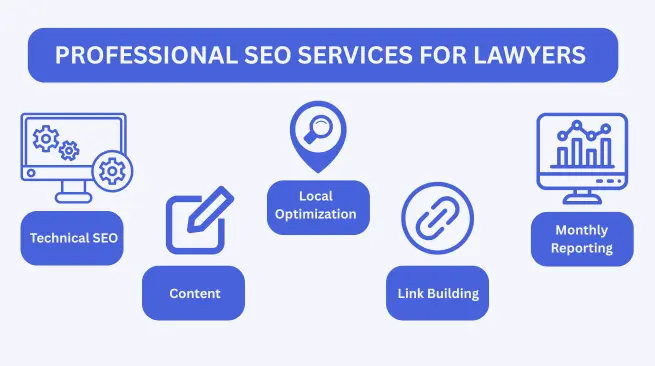
If you want the full suite of SEO services—technical work, content, local optimization, link building, monthly reporting, etc.—expect that investment to scale with the level of competition. In a major city with a saturated legal market, you might be looking at $5,000 to $10,000 per month or more. But if the ROI is 2-3x that in new client revenue, it’s worth every penny.
4. Hybrid Approach
Some law firms prefer a hybrid approach: hire an SEO service provider or law firm SEO company to handle the big stuff—like technical SEO, advanced analytics setup, and major content projects—while you or an in-house coordinator handles smaller tasks, like local citations or collecting reviews. This can reduce costs while still leveraging professional expertise where you need it most.
Diving Deeper: FAQ and Expanded Insights
Let me step back and address a few frequently asked questions. I want you to feel totally equipped because this is not just about handing you a law firm website SEO guide—it’s about making sure you can put it into action.
1. What’s the Difference Between “SEO for Law Firms” and “Legal SEO”?
They’re often used interchangeably. “Attorney SEO” usually zeroes in on marketing individual attorneys or small practices, while “legal SEO” might refer to a broader scope of marketing strategies for all types of law firms. Practically speaking, both terms emphasize the same core strategies: optimizing law firms to be found by the right audience through search engines.
2. How Long Before I See Results from SEO for Lawyers?
It depends on your competition, your starting point, and the resources you invest. Smaller markets with minimal competition might see significant movement in 3-6 months. In large cities or saturated practice areas, it could take 9-12 months for SEO for lawyers to take effect, and you’re consistently hitting top spots. Remember, SEO for law firms is a marathon, not a sprint. Consistent progress over time usually beats any short-lived, “quick fix” approach.
3. Should I Focus on Just Google?
Yes and no. Google dwarfs other online search platforms in market share, so that’s where you’ll get the most traction. However, optimizing for Google for your legal SEO campaign often helps your rankings in Bing or Yahoo because the principles are similar. If you serve a niche or older demographic that might rely on different platforms, it doesn’t hurt to check how your law firm’s online visibility is performing there, too.
4. What About “Law Firm SEO Partner” vs. Doing It In-House?
A true law firm SEO company becomes an extension of your business. They learn your brand, voice, and goals and shape an attorney SEO campaign for law firms around those. While doing it in-house is possible, it typically requires a dedicated employee or team to handle everything from content to link outreach to analytics.
Many attorneys find that a specialized law firm SEO agency is more cost-effective because you pay for proven skill sets to build a well-optimized law firm website rather than training new staff from scratch. Plus, an agency specializing in improving law firms’ search engine rankings often has direct experience in targeting your potential clients. They create an efficient attorney SEO strategy and law firm website.
5. How Much Does Law Firm SEO Cost Overall?
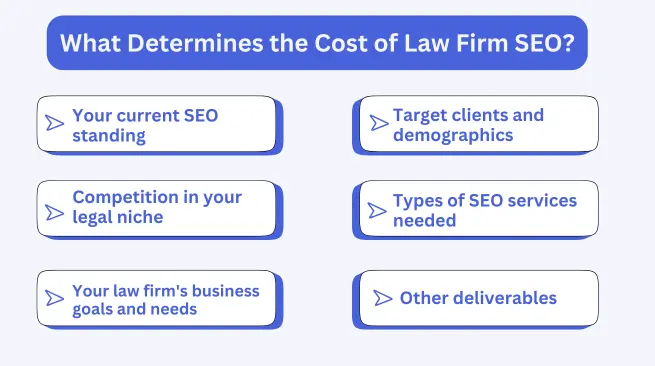
I’ve hinted at this before, but let me be clear: the cost of attorney SEO services can vary widely based on your region, competition level, law firm website design and development, and lawyer SEO service scope. You might spend a few thousand per month in a small town with a narrow niche. If you’re targeting a major metro with multiple practice areas, your monthly budget for law firm SEO services might climb into the high four or even five figures.
Direct instruction: Don’t be lured by cut-rate offers. Ask about deliverables, timelines, case studies, and success metrics. A transparent SEO agency can explain exactly what you’re paying for each month and how it leads to more clients.
6. Do I Really Need Link Building If I’m Creating Content?
Absolutely, yes. Even the best content can stay invisible from your potential clients if no one links to your law firm website. Link building signals to Google that your legal website is authoritative. Without that signal, you’ll struggle to rank on search engine results pages for competitive terms. Think of links as votes in the popularity contest for Google’s front page.
7. What About Local SEO for Law Firms With Multiple Offices?
If you have multiple physical locations, you need a separate Google Business Profile for each (assuming each location is staffed and meets Google’s guidelines). And each location on your site deserves its own page with distinct content. You can’t just copy and paste the same text, swapping out “Orlando” for “Jacksonville.” Google sees that as duplicate content, which can drag down your entire site.
8. Is Social Media Important for Law Firm SEO?
Social signals may have indirect benefits—like brand awareness and traffic generation. But it’s not a direct SEO ranking factor. Still, an active social presence can amplify your content, attracting more eyeballs (and potentially more links) over time. I wouldn’t ignore social, but I also wouldn’t treat it as your primary driver of organic search traffic. SEO is about building domain authority, local relevance, and top-notch content.
9. How Often Should I Update My Content?
You need to update content as often as needed to keep it fresh and relevant. Google loves up-to-date information, especially for legal topics that change with new laws or regulations. If you have older blog posts, consider revisiting them once a year to see if anything needs updating. Also, keep an eye on which pages drive the most website traffic. Doubling down on those can yield quick wins.
10. What’s the Deal with “Legal SEO Services” vs. DIY Tools?
Legal SEO services are typically packages offered by an SEO service provider that specifically cater to law firms—meaning they handle your on-page SEO, local citations, content strategy, and link building with the nuances of legal marketing in mind. DIY tools can help you track keywords and fix basic errors. Still, they won’t craft the entire strategy or handle specialized tasks like building relationships with legal directories or drafting authoritative practice-area content. That’s where experience truly matters.
Step-by-Step Implementation Plan
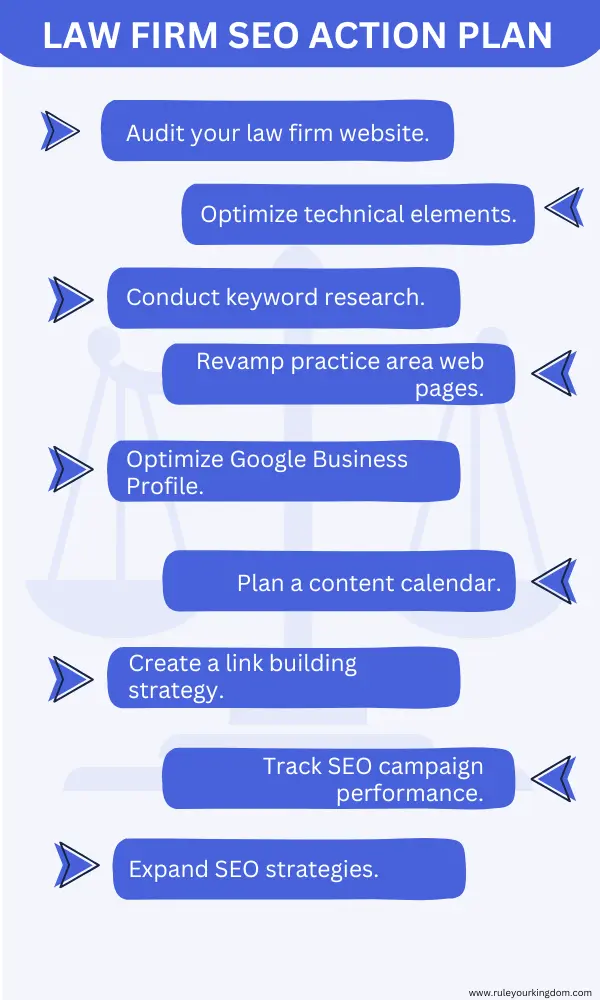
Let me map out an action plan so you can see how all the pieces fit together.
- Audit Your Current Site
- Use a tool like Screaming Frog or Sitebulb to identify technical issues (broken links, missing meta tags, slow pages).
- Check your core web vitals in Google Search Console.
- Evaluate your site structure for clarity.
- Optimize Technical Elements
- Fix broken links, remove duplicate content, and set up 301 redirects where needed.
- Ensure your site is mobile-responsive and loads within two seconds. Google even provides its own tools to get you a quick overview of this.
- Implement or update your SSL certificate (HTTPS).
- Research and Prioritize Keywords
- Perform keyword research to find the most relevant keywords for each practice area.
- Group them by intent: Are they hiring keywords (“hire a personal injury lawyer”), informational (“what to do after an accident”), or local (“Seattle divorce attorney”)?
- Set your target focus keyword for each page.
- Create or Revamp Practice Area Pages
- Write in-depth content that addresses common questions, steps, and potential outcomes in each legal service.
- Add local modifiers if you serve specific regions.
- Optimize titles, headers, and metadata for your chosen primary keyword.
- Set Up or Update Your Google Business Profile
- Make sure your listing is verified.
- Add high-resolution photos, relevant service categories, and an accurate service area.
- Encourage clients to leave reviews.
- Build Out Your Content Calendar
- Plan blog topics that align with your audience’s search intent.
- Commit to at least 1-2 quality posts per month if resources are tight; more if you can manage.
- Interlink blog posts to relevant practice area pages for better user flow and authority signals.
- Start Ethical Link Building
- Identify local community sponsorships, legal directories, and news outlets to pitch.
- Develop linkable assets (whitepapers, eBooks, infographics) that people want to cite.
- Contribute guest articles to high-authority sites.
- Monitor and Refine
- Track your search rankings and conversions in Google Web Analytics and Search Console.
- Check for improvements every month to improve search engine rankings.
- If something’s not working, adjust. This might mean rewriting pages, pivoting your content focus, or targeting different keywords.
- Scale Up
- As you see positive search results, consider investing more in either content production or targeted outreach for links.
- If your firm is expanding, replicate the formula in new markets or new practice areas. From keyword research to content creation, local search results techniques, and web page optimization, your lawyer SEO strategy must be tailored to achieve your law firm website’s unique goals.
Potential Pitfalls to Avoid
- Keyword Stuffing: Don’t jam “personal injury attorneys” or “divorce lawyers” everywhere. Google hates unnatural repetition.
- Ignoring Local: Local signals matter if you serve a specific metro area. Not optimizing your Google Business Profile is a massive missed opportunity.
- Thin Content: Five hundred words slapped together just to rank rarely works. Aim for thorough, well-organized content that genuinely helps your visitors.
- Sketchy Link Schemes: Avoid cheap link networks or spammy directories. One penalty can wipe out months—or years—of progress.
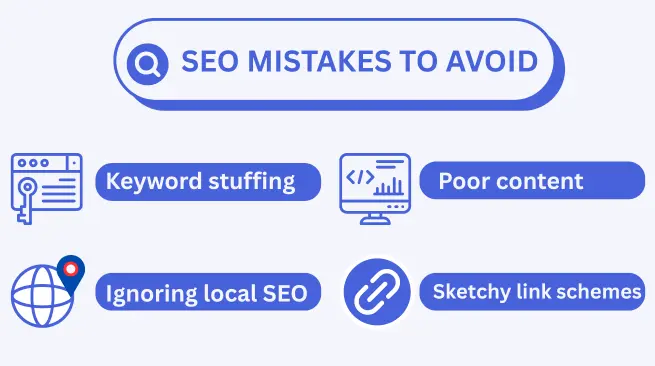
What Success Looks Like
Picture your phone ringing more often with high-quality leads and potential clients who say, “I found your law firm’s site online and liked your reviews.” Imagine opening up your analytics and seeing your organic search traffic steadily climb monthly.
Over time, your brand becomes synonymous with your practice area in your location. That’s the power of a properly executed law firm SEO strategy and a well-developed law firm website. It doesn’t just bring you more website visitors—it brings you the right visitors at the right time, turning them into real clients and real revenue.
Final Thoughts: Your Path to SEO Success
If there’s one lesson I want you to remember, it’s this: SEO for law firms is not about quick wins. It’s about consistent, methodical execution of proven tactics:
- Nail the technical foundation.
- Dominate local search results.
- Produce authoritative, keyword-optimized content.
- Earn trustworthy links from contextually relevant, authoritative, and high-powered sites.
- Track everything so you can adjust and improve.
Yes, it’s work. But once you hit your stride, the payoff compounds. Month after month, you’ll attract potential clients who are actively searching for what you offer.
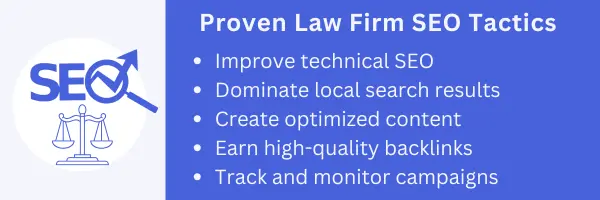
Direct instruction: Don’t just read this and forget it. Take action. If you’re overwhelmed, start with a simple technical audit or craft a single practice area page carefully. Then, keep building. If you need help, find a reputable law firm SEO agency or a specialized law firm SEO specialist who aligns with your goals and budget.
Remember: The only real mistake is doing nothing. Meanwhile, your competitors are busy optimizing, building content, and climbing the ranks.
Your Move
I’ve given you the entire playbook—no secrets, no hidden steps. This expert SEO guide for law firms outlines the exact process that’s driven success for virtually every law firm we’ve worked with.
Now the ball’s in your court. Will you put in the effort? Will you build that local foundation, create meaningful content, and pursue genuine link building? Will you track everything in Google Search Analytics and Search Console to fine-tune your SEO efforts and attract more potential clients?
I’m urging you not to wait. Start small if you must, but start. Each day you delay is another day that potential clients—often with urgent needs—go to someone else.
This is the blueprint. Use it. Commit to it. Execute it. And watch your law firm’s visibility soar as you appear higher in Google’s organic search results and reach your potential clients. That’s how you dominate in 2025 and beyond.
Trust me. I’ve seen it happen over and over again. There’s no reason you can’t be next.

